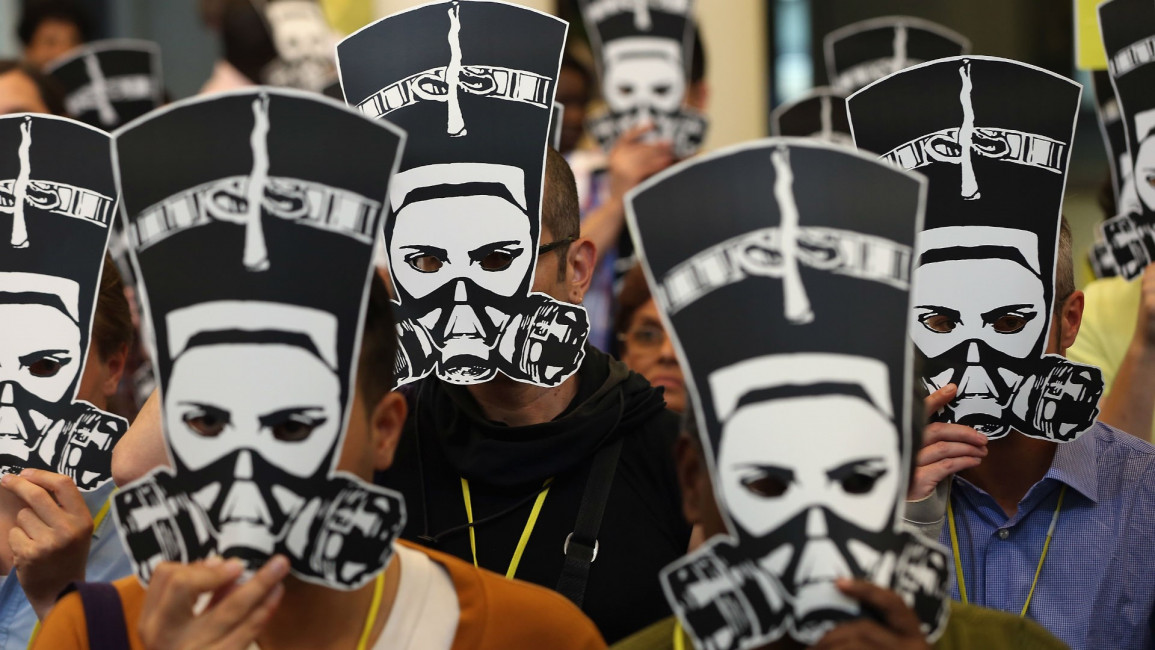
Egypt's tide will turn, and we must be ready
Later this week, the prominent Egyptian revolutionary Alaa Abdel Fattah and 24 others expect to hear their fate on charges of "illegal assembly".
The 33-year-old software engineer and his family have been the targets of repeated vindictive lawsuits by the regime of Abdel Fattah al-Sisi, and are constantly vilified by propagandists in the local media as part of a smear campaign against anyone connected to the 2011 revolution.
His trial was adjourned on Sunday, on the same day an appeals court upheld five-year jail terms for more than 80 Al-Azhar University students, convicted of "rioting".
But the mass trial of the students was hardly news, and occupied a paragraph at best in many news organisations. The country holds trials in kangaroo courts almost on a daily basis, most of which result in death sentences or harsh prison terms.
Many other activists are simply being held indefinitely without charge in Egypt's notorious prison system.
In questionable company
Since his coup on 3 July 2013, Sisi's regime has rounded up more than 41,000 people and killed more than 3,200.
That is more than many infamous military dictators. Chile's Pinochet for example, according to official figures, was responsible for the murder or disappearance of 3,065 people and another 40,018 suffered torture and human rights abuses over the course of his 17-year reign.
| Today, those who fought in Muhammad Mahmoud Street are either dead, in jail, or on trial like Alaa and his co-defendants. |
Sisi reached those numbers in less than a year, and the figure is still climbing.
This is a mere detail of the bigger, uglier picture of Egypt on the third anniversary of the Muhammad Mahmoud Street uprising of November 2011.
The week-long running battles around Tahrir Square between thousands of brave young revolutionaries and armed police and the military was a milestone in the country's revolt, and one which put the forces of the state in retreat.
Waves of revolt
But today, those who fought in Muhammad Mahmoud Street are either dead, in jail, or on trial like Alaa and his co-defendants. Those outside prison can do little, and are busy campaigning for the release of their comrades. Others descended into complete demoralisation and cynicism.
Muhammad Mahmoud Street itself is teeming with police, both uniformed and plain-clothed. Attempts to mark the anniversary were met with immediate brute force and arrests.
The November 2011 uprising was one of the waves of a revolt that started on 25 January 2011 and ended up in defeat on 3 July 2013.
Without risking oversimplification, this revolt was triggered by two issues: police brutality and social inequality. Neither of those issues have been solved - and they have worsened.
This means a revival in street dissent is inevitable in the future. When? It would be foolish to speculate.
The turning tide
At time of writing, 4,000 workers in Helwan's steel mills, south of Cairo, are on strike over pay and claims of corruption among its state management.
Strikes have occurred since the military coup, such as the mass strikes over national minimum wage in February 2014, but they are unlikely to cross over from the economic realm to political street mobilisations soon.
In a time of retreat, those revolutionaries still outside of jail cells must choose their battles carefully. Organising street protests is suicidal in the current climate and such attempts only boost the prison population.
Our limited resources should be solely devoted, during this period of retreat, to cementing what is left of the networks we have built, supporting those held in prison, and trying our best to connect with those economic struggles.
We are awaiting a change in the tide.
Opinions expressed in this article remain those of the author and do not necessarily represent those of al-Araby al-Jadeed, its editorial board or staff.




